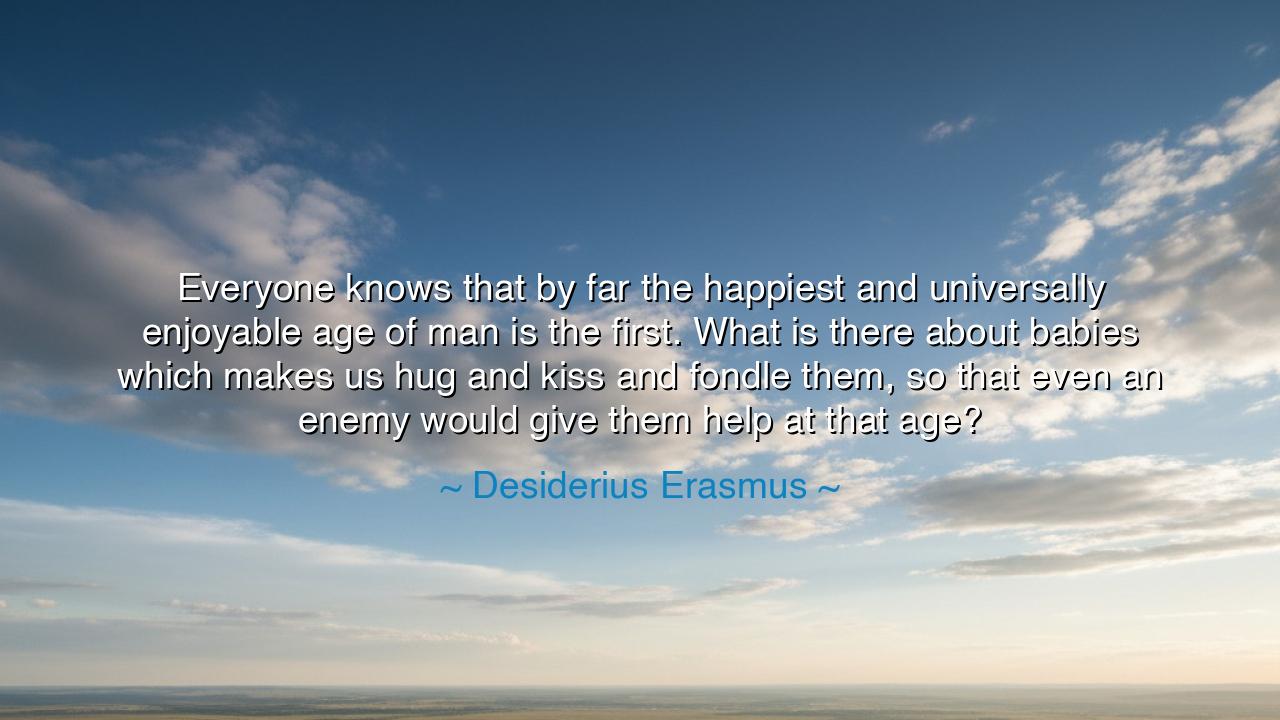
Everyone knows that by far the happiest and universally enjoyable
Everyone knows that by far the happiest and universally enjoyable age of man is the first. What is there about babies which makes us hug and kiss and fondle them, so that even an enemy would give them help at that age?






In the heart of human existence lies a deep truth: the most cherished and universally adored age of life is often the very beginning. Desiderius Erasmus reflects this truth when he says, "Everyone knows that by far the happiest and universally enjoyable age of man is the first. What is there about babies which makes us hug and kiss and fondle them, so that even an enemy would give them help at that age?" These words reveal the profound connection between innocence and joy, and the natural, unguarded state of a baby that elicits the deepest expressions of love, care, and protection. In their first moments, babies embody the purest form of life, untouched by the struggles and burdens that will later define their years.
The ancients often spoke of the power of innocence—the purity that comes before the world imprints itself on the soul. In the teachings of Plato, the soul is believed to enter the world in a state of wisdom, untainted by the corruption of experience. Plato saw this innocence as something that must be preserved and sought after throughout life, for it is in the unclouded heart of a child that we find the most direct connection to the divine. Similarly, Erasmus’s words remind us that babies, in their simplest form, are beings of light, untainted by the complexities and struggles of life, and therefore, their very presence stirs something deeply human within us.
Consider the ancient figure of Socrates, who, although an adult steeped in wisdom and thought, often spoke of the importance of returning to the simplicity of the childlike mind. His philosophy was built on the idea that, much like a child, one should approach life with an open, questioning mind, free from the pride and certainty that often accompanies adulthood. The beauty of Socrates' teachings was his understanding that wisdom is not just in knowing, but in being open, much like the child who does not yet have the answers but is full of curiosity and wonder. This same sense of awe and wonder that we attribute to babies is the very essence of learning, growth, and connection.
But it is not just the innocence of babies that compels us to love them. There is also a deep, almost universal magnetism in their vulnerability. When a baby enters the world, they are entirely dependent on others for survival, and yet their helplessness invokes an instinctual sense of care, even from those who may have no direct connection to them. This truth was famously reflected in the actions of Queen Elizabeth I of England, who, despite the complexities and struggles of her reign, carried a soft spot for children and often extended her patronage to orphaned infants. The vulnerability of babies is a reminder of the fragility of life, a state that calls for protection, and in this state, even the hardest hearts soften.
In Erasmus' reflection, we see that the connection between humanity and its youngest members is built on empathy, a recognition of the shared experience of human existence. Even an enemy, he suggests, would be moved by the sight of a helpless child, such is the universal appeal of their innocence and fragility. This universal appeal speaks to a truth that has been echoed throughout history—that in the presence of the vulnerable, even the most hardened individual can be touched. The ancients believed that showing mercy to the vulnerable, whether a child or an elder, was a sign of true humanity. The love we show toward children is not merely a social construct, but a reflection of our deepest, innate connection to the universe and the human condition.
The lesson of Erasmus’ words is one of universal love and empathy. Just as babies invoke feelings of warmth and care, so too should we cultivate these qualities in our own lives. The beauty of life is often found in its simplest forms—the tenderness we show to the most vulnerable, the quiet moments of connection that remind us of our shared humanity. Erasmus teaches us that we must hold onto the innocence and empathy we are born with, nurturing these qualities throughout our lives.
Therefore, let us take from the wisdom of Erasmus a deep sense of compassion and wonder for the world around us. Let us remember that in each baby, there is not only a reflection of our own humanity but a reminder of the purity and joy that life can offer. Whether we are parents, mentors, or individuals simply walking through life, we are called to protect, nurture, and love those who need it most—just as we would a baby, who brings out the best in us through their very innocence and vulnerability. In this, we find not only joy but meaning, for in caring for the youngest among us, we are reminded of what is truly important: the purity of love, the strength of empathy, and the shared connection of all humanity.






AAdministratorAdministrator
Welcome, honored guests. Please leave a comment, we will respond soon